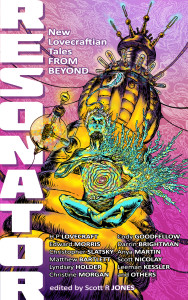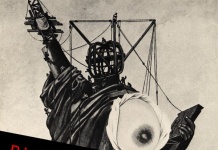 Considering how famous he is for the tentacles, mad gods, and assorted Yog-Sothothery of the Cthulhu Mythos, H.P. Lovecraft produced some of his best and most evocative shorter tales quite outside that sub-genre. One such is “From Beyond,” which inspires and kicks off this volume, and which introduces the now-notorious Tillinghast Resonator, a device which takes a wrecking ball to the doors of perception, and opens puny human minds to “whole worlds of matter, energy, and life which lie close at hand yet can never be detected with the senses we have.” Needless to say, Lovecraft being Lovecraft, those minds – and the attached bodies – don’t survive unscathed. (And for more on Lovecraft’s interest in the pineal gland, which dormant organ the Resonator reactivates to actually perceive these malign dimensions, read here.)
Considering how famous he is for the tentacles, mad gods, and assorted Yog-Sothothery of the Cthulhu Mythos, H.P. Lovecraft produced some of his best and most evocative shorter tales quite outside that sub-genre. One such is “From Beyond,” which inspires and kicks off this volume, and which introduces the now-notorious Tillinghast Resonator, a device which takes a wrecking ball to the doors of perception, and opens puny human minds to “whole worlds of matter, energy, and life which lie close at hand yet can never be detected with the senses we have.” Needless to say, Lovecraft being Lovecraft, those minds – and the attached bodies – don’t survive unscathed. (And for more on Lovecraft’s interest in the pineal gland, which dormant organ the Resonator reactivates to actually perceive these malign dimensions, read here.)
As Scott R. Jones, editor of the volume and moving spirit behind the brilliantly-named Martian Migraine Press, explains, “it’s a powerful little story, and the wicked inspiration for the book you hold in your hands. There are hints of greater wonders in Lovecraft’s tale .. It’s those hints that we wanted to expand upon in Resonator: New Lovecraftian Tales From Beyond.”
You can see the attraction for modern cosmic horror writers in this short tale. The treatment allows them to tackle the underlying theme of an unknowable, uncaring cosmos infinitely out of reach of pitiful mammalian sensoria and intellects, without getting into the occasionally sillier aspects of monsters, madness, and miscegenation. And the possibilities are limited only by the writer’s imagination. Hence creepy tales of desire and sex twisted between dimensions like Cody Goodfellow’s “Infernal Attractors” or Matthew M. Bartlett’s “Machine Will Start When You Are Start,” or apocalyptic chillers like like Richard Lee Byers’s “Bug Zapper” or Scott R Jones’s own “Turbulence.” There are subtle allusions to other arts, as in Anya Martin’s Warhol homage “Resonator Superstar!” or Christopher Slatsky’s “Film Maudit.” There are sad and grim little vignettes like Orrin Grey’s “Programmed To Receive,” Christine Morgan’s “Ninesight,” or Scott Nicolay’s “The Wizard of OK.” Or there are firmly tongue in cheek japes like Edward Morris’s “The Happiness Machine” or Darrin Brightman’s “IPO.” One or two tales do feel just a little too familiar – or derivative – but overall, it’s a bright, pulsing, squirming bundle of dangerous extrusion into normally sane reality, that does a good job of taking Lovecraft’s original premise far further. And I’ll avoid any cheesy jokes about resonant narrative …


































